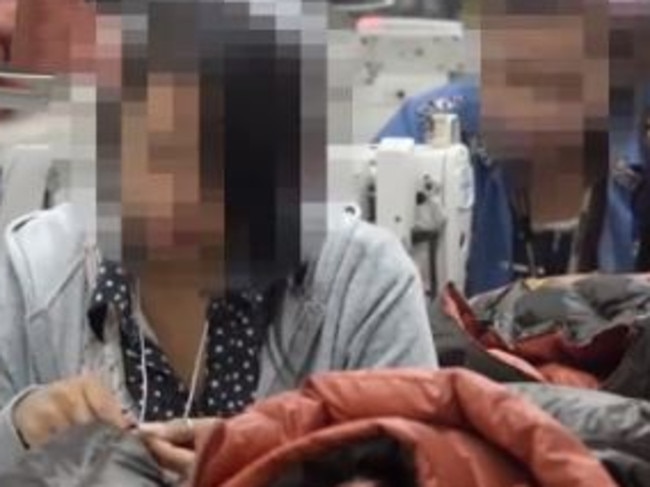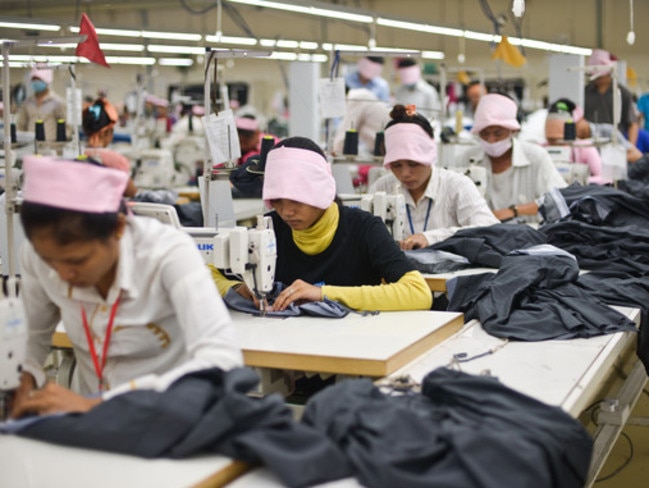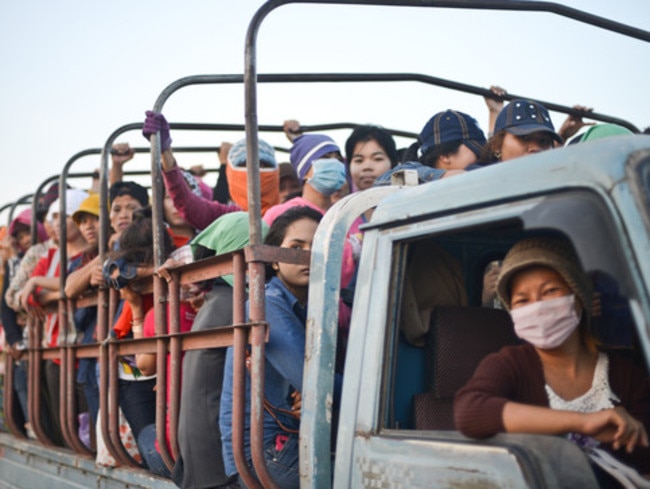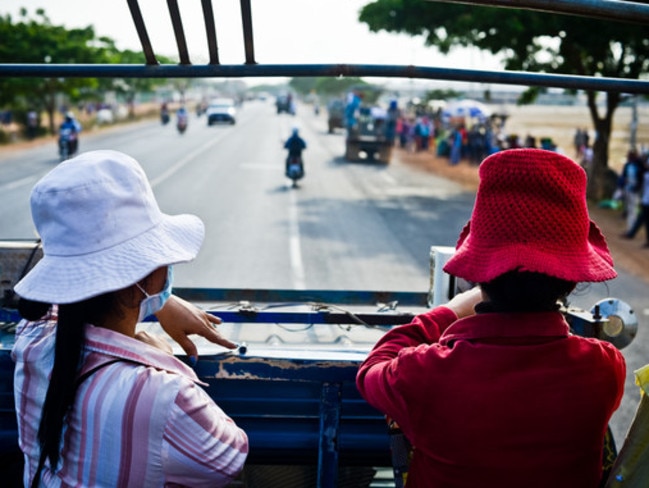Made in Cambodia: Labour laws ‘failing to protect garment workers’
GROPING, sexual harassment and pressure to have abortions. These are the dirty secrets sewn into some of our favourite big brand clothing. And we are literally wearing the blame.
IT’S the dirty secret sewn into some of our favourite big brand clothing.
A stinging report into the garment industry has exposed the terrible conditions female factory workers are suffering through, including daily sexual harassment, indecent assaults and pressure to have abortions in order to keep their jobs.
And here in Australia, we are literally wearing the blame.
Human Rights Watch has found Cambodian suppliers of major brands including H&M, Armani, Adidas and Gap are failing to comply with labour laws that would protect garment workers, 90 per cent of whom are women.
In its 140-page report, Work Faster or Get Out’: Labor Rights Abuses in Cambodia’s Garment Industry, HRW reveals female garment workers were being groped, threatened and sexually propositioned by male colleagues and managers, creating an atmosphere of fear and intimidation.
Female workers also experienced forced overtime, pregnancy-based discrimination and anti-union practices that “neither the government nor major brands have adequately addressed,” the report found.
While it focused on conditions for Cambodian workers, HRW said many of the clothes wound up in stores across the world, including in Australia, and the labels involved had a responsibility to do more to pressure their suppliers to enforce labour laws.

‘YOUR BREASTS LOOK LARGER THAN USUAL TODAY’
Among the findings were shocking levels of sexual harassment suffered by female workers at the hands of male colleagues and managers, which left many intimidated.
At least one in five reported such harassment had led to a threatening work environment.
Some women said their managers called them “prostitutes” and “s***s” to demean them while others reported much more open harrasment.
One worker told HRW while women workers were intimidated by the harassment, many didn’t say anything for fear of losing their jobs.

“The managers say things with sexual connotations ‘I want to kiss you. I want to sleep with you for just one night,” the worker said.
“Sometimes even male workers at our level speak to us like this. They will touch our hair, hands, or other parts of our body. If we say anything they will laugh and say “Oh, we just touched you a little bit — why do you mind?”
Another said she was constantly harassed by a male worker.
“Each day it’s something different. One day he says ‘Oh your breasts look larger than usual today’. On another day, he says, ‘You look beautiful in this dress — you should wear this more often so I can watch you.’ There are others who purposely brush past us or pinch our buttocks while walking. Sometimes I feel like complaining. I don’t like it at all. But who do I complain to?

‘I ABORTED MY BABY TO KEEP MY JOB’
Other women said they feared getting pregnant as it could lead to their sacking, while some even had abortions just so they could keep their jobs.
Human Rights Watch found that many factories repeatedly issued unlawful short-term contracts to avoid paying workers maternity and other benefits.
One worker told HRW she didn’t go through with a pregnancy as she didn’t want to risk losing her job.
“I decided to abort my baby so I could go back to work,” she said.
“So that I could be a good worker, and maybe they would be happy with me.”
SORRY, NO TOILET BREAKS
Cambodian labour law stipulates that any overtime work is conducted on a voluntary basis, however workers from 48 factories supplying to international brands told Human Rights Watch they had no choice.
Those who didn’t agree to overtime were hit with dismissals, wage deductions, and punitive transfers.
Others told HRW they were pressured to meet production targets, with many unable to take lunch breaks or even use the toilet.

‘THESE BRANDS ARE HOUSEHOLD NAMES’
Arena Kashyap, senior women’s rights researcher at Human Rights Watch called on the Cambodian government to take swift measures to reverse “its terrible record of enforcing its labour laws and protect workers from abuse”.
“These global apparel brands are household names,” she said.
“They have a lot of leverage, and can and should do more to ensure their contracts with garment factories are not contributing to labour rights abuses.”
While acknowledging that Cambodia had fairly strong labour laws with good protection for workers she said the main problem was that many factories frequently got away with flouting the labour law provisions.
“H&M, Gap, Adidas and other brands sell many garments from Cambodia each year,” she said.
However, she warned smaller factories in particular appeared to be completely unmonitored by the government and only a handful of brands are being transparent about their supply chains and
disclosing the names of the factories.
She said H&M and Adidas were among a handful of brands doing this but more needed to follow.
Adidas Group’s South-East Asia spokeswoman Akkaphan Rammanee said the company was committed to transparency.

“We disclose the name of the factories and the licensees and also their locations and the country,” she said.
Human Rights Watch was in contact with six major suppliers including Adidas, Gap, and H&M who “seriously discussed their efforts to address the problems found.”
HRW said Adidas and H&M also publicly disclosed the names of their suppliers and periodically update their lists, while Marks & Spencer has committed to disclosing its supplier list in 2016.
However, only Adidas has created a process for workers to seek whistleblower protection.
“H&M is one of the leading fashion retailers globally when it comes to sustainability, and we welcome monitoring of our sustainability work,” H&M said in a statement.
“Regarding the report from Human Rights Watch, we have provided detailed written responses to their letters, and met with Human Rights Watch in Bangkok as well as Phnom Penh during 2014.
“We have asked for information about the factories mentioned in the report to be able to follow up, but Human Rights Watch has not been willing to share that information.”
WE ALL PAY:
Cambodia’s garment industry is dominated by foreign investment with women making up 90 per cent of the country’s more than 700,000 garment workers across 1200 garment businesses, according to the Ministry of Industry and Handicraft.
The Human Rights Watch report is based on interviews with more than 340 people, including 270 workers from 73 factories in Phnom Penh and nearby provinces, union leaders, government representatives, labour rights advocates, the Garment Manufacturers Association of Cambodia, and international apparel brand representatives.
Of roughly 200 apparel brands that source from Cambodia, Human Rights Watch was in contact with Adidas, Armani, Gap, H & M, Joe Fresh, and Marks & Spencer.
Better Factories Cambodia (BFC) is a third-party monitor mandated to inspect all factories with export licenses and produces factory-specific reports.
However Human Rights Watch found that some smaller subcontractor factories without export licenses are excluded from inspections but are supplying indirectly to major brands via larger factories.
Adidas and Armani have all been contacted for further comment regarding the report.



